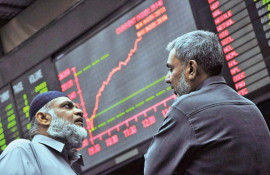
Food inflation has continued to pose a challenge to the government as prices of major kitchen items including wheat flour, cooking oil and sugar have gone sky-high despite the constitution of a committee to curb prices in the country.
Industry officials said that prices had been on the rise partly due to the return of middlemen to the supply chain of commodities.
They have also continued to speculate a likely shortfall in supplies that has kept prices at high levels.
Besides, a significant surge in international prices of wheat and cooking oil also impacted rates in the domestic market.
The price of wheat flour (quality no 2.5) increased to Rs64 per kg in retail from Rs58 a few days ago in Karachi while the price of sugar surged to Rs90-100 per kg from Rs80.
Similarly, the price of average quality cooking oil peaked at around Rs270 per litre from Rs220-225 in the city.
Usually, prices are higher in other cities compared to Karachi. Finance Minister Abdul Hafeez Shaikh had constituted a committee at the beginning of current month to curb price inflation in food items including wheat, sugar and cooking oil.
The committee is led by Federal Minister for Industries and Production Hammad Azhar. Ministry of National Food Security and Research secretary and other stakeholders are members of the committee.
So far, food inflation is the only kind of inflation which is not declining whereas non-food and non-energy inflation has remained under control.
“Middlemen have returned to the speculative business of sugar,” a dealer at Jodia Bazaar said while talking to The Express Tribune.
Price of the sweetener has surged at a time when its production season (Nov-Mar) is in full swing. New supplies of the commodity have reached wholesale and retail markets.
“This means that there is no shortage of the commodity but speculative elements are playing games to mint money,” he said.
Reports suggest that production of sugarcane has increased 15% in lower Punjab - a major cultivation area. Besides, the average production of sugar from sugarcane has gone up to 14% compared to an average of 10-11% in the past.
Karachi Wholesale Grocers Association (KWGA) Chairman Malik Zulfiqar Ali said sugar was being sold for Rs88-88.5 per kg in wholesale markets these days compared to Rs72-73 a couple of weeks ago. “The rate has been enhanced by the sugar millers.”
A spokesperson for the Pakistan Vanaspati Manufacturers Association (PVMA) said that prices of cooking oil and ghee had remained high in domestic markets in line with the surge in prices of the two commodities in the international market.
“Pakistan meets 90% of its requirement of cooking oil and ghee through import of raw material (palm oil) and refined products,” he said.
The price of refined palm oil peaked at $1,080 per ton a few days ago compared with around $900 in the recent past.
Prices have been on an uptrend since November following the drop in production of palm oil and seeds to historic lows in Indonesia and Malaysia in the wake of Covid-19. Similarly, prices of soybean and sunflower have risen in the world market.
They are usually priced nearly $100 per ton more than the price of palm oil.
Another dealer at Jodia Bazaar said that wheat price shot to a high of Rs63 per kg in wholesale compared to Rs58 in the recent past.
“The price has maintained the uptrend following a slowdown in imports while local production will arrive in markets at the end of February or the beginning of March,” he said.
The dealer said that the government had decided to import more wheat to maintain supplies and bring down prices.
“However, the price of wheat has shot up to $305 per ton in the world market compared to $235 per ton at the time when Pakistan received the first vessel of imported wheat in August-September 2020.”


1732271743-0/diddy-(45)1732271743-0-165x106.webp)















COMMENTS
Comments are moderated and generally will be posted if they are on-topic and not abusive.
For more information, please see our Comments FAQ